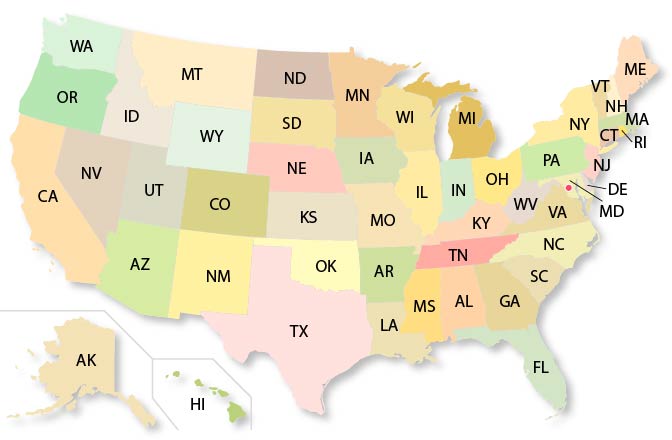Project Lyme’s Commitment to Advocacy
Project Lyme is focused on developing a strong community of advocates through various initiatives, including our sponsorship of the Center for Lyme Action, our affiliation with the Tick JEDI Coalition, and our encouragement of new advocates via social media and educational events.
We have compiled this resource to further educate advocates about the types of legislation that have been passed at both federal and state levels. This resource will serve to showcase legislation that has been successful, so that they may leverage this information to help pass similar bills in other states. It is important to keep in mind that the language of legislation that ultimately passed may represent a compromise, rather than an ideal bill.
Types of Legislation
Increase Funding for Research
Tick-borne diseases have typically been underfunded in comparison to similar vector-borne diseases. In order to make legitimate progress for developing effective diagnostics and therapeutics for chronic cases, additional funding is required. Recently, Congress has made a push in the right direction following the passing of U.S. Senator Kay Hagan due to Lyme-related causes. The creation of the Kay Hagan Tick Act received significant support from legislators, and while it was not passed as an individual bill, the Act was worked into other legislation that was passed. In total, it allocated an additional $30 million in funding to help identify, control, and knockout tick-borne diseases. Most recently, Illinois passed House Resolution 780 “that we urge the federal government to allocate more funding toward finding a cure for the devastating and increasingly prevalent public health crisis that is Lyme disease”.
Learn More
Protect Doctors
Unfortunately, there is a deep divide in the standard of care for how to care for patients who experience persistent or relapsing symptoms after a limited course of antibiotics as set forth in IDSA guidelines. Lyme specialists who often take a more clinical, individual approach to treating patients have historically been attacked by medical boards and insurance companies. Many places around the country still do not offer appropriate protections for doctors who are typically working with the best interests of patients in mind. There are currently a couple of examples of doctor protection bills from around the country. In 2014, New York State Senate passed Bill S7854 “prohibiting the investigation of any claim of medical professional misconduct based solely on treatment that is not universally accepted by the medical profession”. In 2019, the Illinois General Assembly passed Bill HB4515 which “grants medical providers immunity from disciplinary action by the Department of Financial and Professional Regulation for the experimental treatment of Lyme disease or other tick-borne diseases.
Learn More:
Raise Awareness
Awareness bills are typically the easiest to pass. Their main purpose is to create opportunities for wider dissemination of information about Lyme and tick-borne infections. Some ways they may do this are by creating Lyme disease awareness days or requiring state agencies to develop awareness campaigns. As a highly endemic region, New York has an urgent need for education and awareness to avoid a spike in cases. They have passed two recent pieces of legislation relating to raising awareness. In 2017 the NY State Senate passed Bill S7242 that “relates to installing Lyme and tick-borne disease warning signs at all state-managed parks.” In 2021, the NY Legislature doubled down by passing Senate Bill S4089 to raise awareness about Lyme and other tick-borne illnesses among farmers and farmworkers, who are at a high risk of infection. Given the support of raising awareness, several other states including Colorado and Delaware have made proclamations to assist in awareness efforts. In 2017 Delaware passed Resolution No. 24 declaring May to become the official month of Lyme disease awareness. The Governor of Colorado made a similar move, putting out a signed proclamation of Lyme awareness month in 2017, 2018, and 2019. Most recently, Illinois passed House Resolution 780 officially declaring May as Lyme Awareness Month for 2022.
Learn More:
Mandate Insurance Coverage for Persistent Lyme
Many insurance companies only cover a short course of antibiotics, which typically is not enough to eradicate a more progressed case. As such, patients are often forced to pay out of pocket for the extended courses that are needed to get well again. Bills focused on this issue work to establish minimum required coverages for insurance companies and seek to include coverages for chronic conditions. For example, in 2016, the state of Massachusetts passed Bill H4491 that would increase Lyme disease coverage. It stated that anyone with health coverage in the state of Massachusetts shall be provided coverage for the long-term antibiotic therapy of Lyme disease when determined to be medically necessary. Several other states including Illinois and Pennsylvania have passed similar legislation ensuring patients receive coverage for longer terms of treatment. In 2019, Illinois passed Bill HB0889 which “amends the Illinois Insurance Code, requiring an individual or group policy of accident and health insurance or managed care plan to provide coverage for long-term antibiotic therapy for a person with a tick-borne disease.” In 2020, Pennsylvania passed House Bill 629, which works to require certain coverages for Lyme patients. The bill requires companies to “provide coverage for long-term antibiotic and antimicrobial therapy for a patient with Lyme disease… when determined by a healthcare provider.” These bills serve as a great example of clear and direct messaging that was adopted by Lyme advocates in one state and were used when passing legislation in another state.
Learn More:
Notifying Patients Negative Test Does Not Rule Out Lyme
Current Lyme disease diagnostic tests are notoriously unreliable, but if you have been bitten by a tick you may not know this. That is why several states have worked to require notifying patients of testing issues, outlining that it is still possible to have Lyme disease even with a negative test. In 2013, the Virginia state legislature passed House Bill 1933, which “requires physicians to provide to each patient for whom a test for the presence of Lyme disease is ordered a written notice about Lyme disease, about testing for Lyme disease, and about the need for the patient to contact his physician with questions or concerns about Lyme disease.” The neighboring state of Maryland passed a similar bill in 2016. Senate Bill 926 changed the health code in the state requires doctors and labs to provide a notice that outlines the issues and that if you still experience symptoms after a negative test, you will need to seek treatment. The entire notice can be read on the state’s website.
Track Lyme-Related Deaths
In order to work against underreporting of Lyme cases, the New York State Legislature began requiring proper tracking of Lyme disease-related deaths in 2021. This is an important step to gain larger acceptance of chronic cases. This is the only legislation of its kind but would serve as a good base for other states to pass similar bills.
Learn More
Encourage Health Education to Prevent Tick Bites
Prevention is key to stopping the further spread of tick-borne disease. Prevention education helps to ensure more people are aware of strategies to avoid bites and better identify symptoms. Passing legislation regarding this education will lead to further understanding of the issues and ideally, lower cases of tick-borne disease. Recently, the Illinois legislature passed House Resolution 780. This resolution stated, “that we encourage the Illinois Department of Education to begin health education to prevent tick bites for children who represent the highest risk group for tick-borne diseases”. While it does not make it mandatory, this is an important step in the right direction to making prevention education more accessible.
Learn More:
Lyme Advocate Best Practices
While the road to passing legislation is full of good intentions, it is never an easy path. There will typically be opposition and amendments, but you will need to make sure legislators stick to the underlying purpose. A couple of ways to ensure effective legislation is to:
- Determine legislative goals and language, making sure to hold firm when amendments are proposed.
- Ensure that verbiage is not too vague and doesn’t get changed along the way.
- Work with legislators who are willing to kill the bill if it doesn’t fit with long-term goals.
For a full roadmap to success when passing legislation, you can check out our Become a Lyme Advocate resource.



